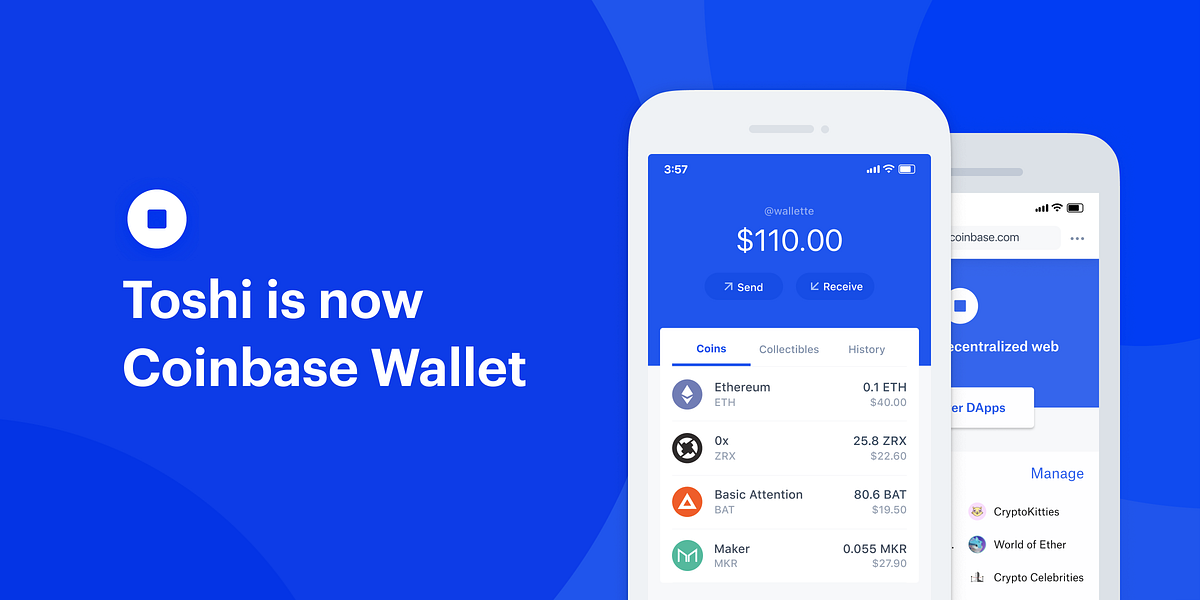

- #BLOCKCHAIN WALLET WITH COINBASE SOFTWARE FOR PC#
- #BLOCKCHAIN WALLET WITH COINBASE SOFTWARE#
- #BLOCKCHAIN WALLET WITH COINBASE PASSWORD#
- #BLOCKCHAIN WALLET WITH COINBASE OFFLINE#
For added security, some wallets may also allow for two-factor authentication. You'll be prompted to create security keys that you'll want to keep in a safe place.
#BLOCKCHAIN WALLET WITH COINBASE SOFTWARE#
Once you've decided on a blockchain wallet, you'll want to set up an account - or download the app or software if you're using a mobile or desktop wallet. These private keys will be managed by you when using a mobile or desktop software wallet or a cold storage hardware wallet.

The second is a private key (basically a password), which is one you'll want to keep safe since it will be used only by you to manage any movement of your cryptos. It will be shared with other crypto users for doing things like making purchases, accepting payments, or transferring cryptos to other accounts. The first is a public key, which is automatically created when setting up a wallet and is used for crypto transactions.
#BLOCKCHAIN WALLET WITH COINBASE PASSWORD#
This offers the highest level of security, but you'll be responsible for keeping track of your security keys (like a private password only you know more on that below). The wallet can be connected to a computer via USB or other port to facilitate transfers and transactions but are otherwise a way to keep crypto access in cold storage.
#BLOCKCHAIN WALLET WITH COINBASE OFFLINE#
Hardware walletsĪ hardware wallet takes security a step further and allows for access to your cryptos to be stored on an offline piece of hardware. Many of these blockchain wallets offer cold storage options for added security. Examples of desktop-based wallets include MetaMask, Exodus, and Electrum.
#BLOCKCHAIN WALLET WITH COINBASE SOFTWARE FOR PC#
Like their mobile counterparts, a desktop wallet is software for PC users. Mobile wallets often provide hot storage since they can be linked to an exchange, but some may provide added security with offline options (known as cold storage). Popular options include Coinbase Wallet (a separate app from the hosted custodial exchange), Mycelium, and Trust Wallet (which is part of the top crypto exchange Binance). Some of these apps are non-hosted, meaning you'll be responsible for saving and managing your private key to access your cryptos. There are two basic types of blockchain wallets: software wallets and hardware wallets.Ī mobile wallet is software on a smartphone or tablet. What is a blockchain wallet?Ī blockchain or crypto wallet is a way to manage, secure, and use cryptocurrencies such as Bitcoin ( CRYPTO:BTC) and Ethereum ( CRYPTO:ETH) and other digital assets based on a blockchain (for example, an NFT). Here's what you need to know and some points to consider when choosing the type of blockchain or crypto wallet to use. With the rising adoption of cryptocurrencies as an investment asset class, digital payments option, and digital economy facilitator, people who own cryptos should be familiar with blockchain wallets and their uses. He enjoys the outdoors up and down the West Coast with his wife and their Humane Society-rescued dog.įollow as a physical wallet allows you to store your money, a blockchain wallet allows you to manage and use your cryptocurrencies and other blockchain-based digital assets. He is also the founder and president of Concinnus Financial, a Registered Investment Advisor based in Spokane, WA. Nicholas has been a writer for the Motley Fool since 2015, covering companies primarily in the consumer goods and technology sectors.


 0 kommentar(er)
0 kommentar(er)
